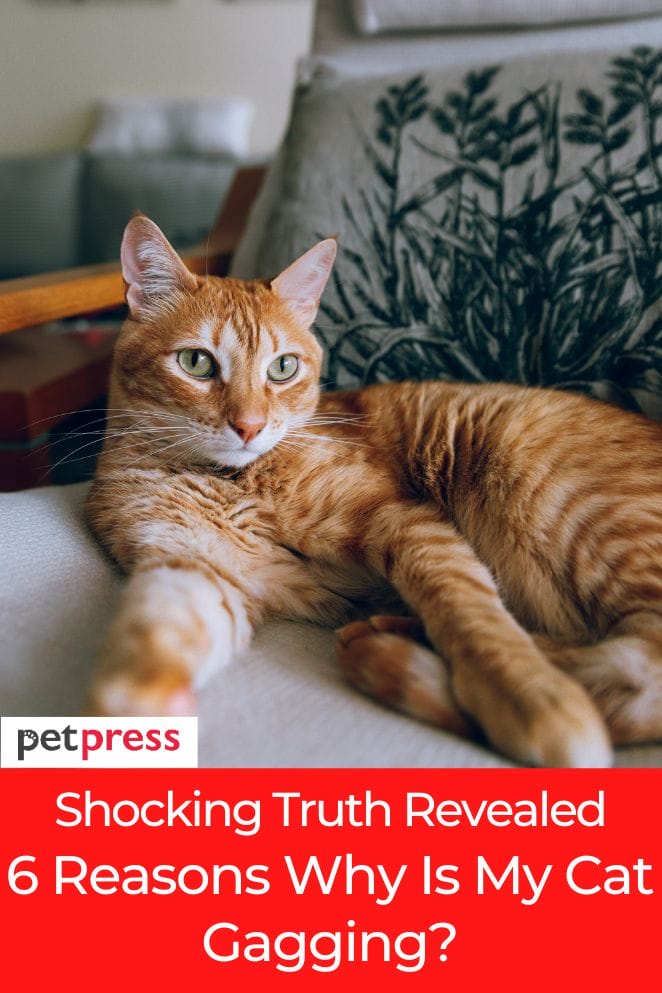
Have you ever been taken aback by the rather disconcerting sound of your dear feline companion experiencing bouts of gagging?
This startling noise has the capacity to evoke concern in any devoted cat owner. In the forthcoming article, we shall embark on an insightful exploration of the intricacies surrounding the phenomenon of gagging in cats.
Our journey will encompass an examination of the potential reasons behind this behavior, an exploration of preventive strategies, and the provision of invaluable insights aimed at safeguarding the enduring well-being and contentment of your cherished feline friend.
Why Is a Cat Gagging?
Cat gagging can be triggered by various factors, and understanding them is crucial for your cat’s well-being:
Hairballs
One of the most prevalent reasons for occasional gagging in cats is the formation of hairballs in their digestive tract.
Cats are meticulous groomers, and as they lick their fur to maintain cleanliness, loose hair often becomes ingested.
This accumulation of hair can lead to the need for your feline friend to expel these hairballs periodically.
Understanding this common aspect of feline behavior is crucial for pet owners.
Foreign objects
Cats are renowned for their curiosity, and this trait sometimes leads them to ingest non-food items like strings, rubber bands, or small toys.
Gagging can serve as a sign that your cat is attempting to clear these foreign objects from their throat.
It’s imperative for cat owners to be vigilant about potential hazards in their environment, ensuring that small items or substances that could be ingested are out of reach.
Respiratory issues
Gagging can also serve as a symptom of underlying respiratory problems in cats, such as asthma or allergies.
These conditions can trigger bouts of coughing and gagging as your feline companion endeavors to clear their airways.
Recognizing these signs of potential respiratory distress is vital for prompt veterinary evaluation and appropriate management.

Dental problems
Dental issues can pose a significant concern for our feline companions.
Conditions like gum disease or tooth decay may lead to discomfort, occasionally resulting in gagging episodes.
It’s imperative for cat owners to grasp the link between oral health and these instances of gagging.
This understanding emphasizes the necessity of routinely caring for your cat’s teeth and gums, in addition to scheduling regular veterinary check-ups to ensure their dental well-being.
Heart disease
Heart disease can be a concerning issue for our feline companions.
This condition has the potential to lead to the accumulation of fluid in their lungs, consequently giving rise to episodes of gagging.
It is of utmost importance for cat owners to maintain vigilance and attentiveness to the broader spectrum of symptoms that may accompany heart disease.
These encompass challenges in breathing, persistent coughing, and unexplained weight loss.
Ingestion of a toxin
The consumption of toxins represents a grave and immediate concern when it comes to our feline companions.
This perilous encounter with toxic substances can usher in a range of distressing symptoms, including the unsettling occurrence of gagging and subsequent vomiting.
Substances like antifreeze or common household cleaning products can present grave threats to the health of cats.
In the event that you harbor suspicions regarding your cat’s ingestion of such toxic agents, it is absolutely imperative to swiftly seek the expertise of a veterinary professional.

How to Prevent Your Cat from Gagging
Preventing cat gagging involves addressing the underlying causes:
Regular grooming
Embracing a routine of brushing your cat is not merely a cosmetic endeavor but a key practice to significantly diminish the formation of those troublesome hairballs.
This simple yet effective act of grooming can go a long way in keeping your cat comfortable and minimizing the discomfort associated with hairball-related gagging.
It’s a bonding experience as well as a preventive measure.
Safe environment
A cat’s world is one of exploration, and their curiosity knows no bounds.
To reduce the risk of gagging due to ingested foreign objects, it’s paramount to maintain a safe home environment.
Be watchful for small items that could pique your cat’s interest and potentially be swallowed.
This is particularly crucial if you’re blessed with a playful and inquisitive feline companion.
Dental care
Oral health matters for cats just as much as it does for humans.
Regular dental check-ups with your veterinarian and providing dental treats or toys can go a long way in preserving your cat’s oral health.
By ensuring healthy teeth and gums, you not only contribute to their overall well-being but also reduce the chances of dental issues causing discomfort or contributing to gagging episodes.
Allergen management
If your cat grapples with respiratory issues, such as allergies or asthma, it’s paramount to consult with your veterinarian.
Together, you can develop a comprehensive plan for managing these conditions effectively.
This may involve identifying and minimizing allergens in your home environment and implementing strategies to alleviate your cat’s symptoms and enhance their quality of life.
High-fiber diet
To promote a healthy digestive system and reduce the likelihood of troublesome hairballs, consider feeding your cat a high-fiber diet.
This dietary choice can aid in the natural passage of ingested hair through their system, minimizing the need for them to expel hairballs, which can be uncomfortable and distressing.

Avoid giving your cat human food
While it might be tempting to share tidbits of human food with your feline companion, exercise caution.
Some human foods, such as bread and pasta, have the potential to swell in your cat’s stomach, increasing the chances of them vomiting up hair or experiencing digestive discomfort.
Opt for cat-specific treats or foods to ensure their dietary well-being.
Plenty of water
Adequate hydration is vital for your cat’s overall health, especially when it comes to managing hairballs.
Providing your cat with an ample supply of clean, fresh water can help keep them well-hydrated, making it easier for them to pass hairballs through their system comfortably.
Conclusion
Although cat gagging can be a cause for concern, it’s usually a challenge that can be effectively addressed with the appropriate care and diligence.
By comprehending the potential reasons behind this behavior and proactively taking preventive measures, you can ensure the well-being and contentment of your cherished feline companion, keeping them in a state of happiness and robust health.
FAQs
Yes, occasional gagging can be normal, especially if it’s due to hairballs. However, frequent or persistent gagging should be evaluated by a veterinarian.
It’s best to consult your veterinarian before giving your cat any medication or remedy. They can recommend the most suitable option for your cat’s specific needs.
While any cat can experience gagging, long-haired breeds may be more prone to hairballs, which can lead to gagging incidents.
If your cat’s gagging is persistent, accompanied by other concerning symptoms like lethargy or loss of appetite, or if you notice blood in their vomit, consult your veterinarian promptly. It could indicate a more serious underlying issue that needs immediate attention.


GIPHY App Key not set. Please check settings